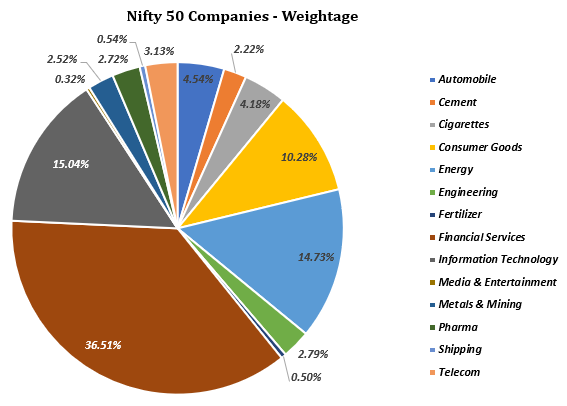As interest in the stock market continues to grow, savvy investors are motivated to learn more about the sector’s diverse lingo. This is also what led you here, correct?
In light of this, you must have noticed the stock market generating headlines about a specific industry sweeping the market. In particular, because of the presence of COVID, some industries, such as healthcare and consumer goods, had a significant rise, while others, such as aviation, did not appear to have exited the building until very recently.

What Are Sector-Wise Stocks?
What would you search for on Amazon Prime Video if you were looking for anything to give you the chills? A section on suspense, right? Or, if you are searching for the greatest stocks under Rs 1 to invest in, you will immediately visit Kuvera’s blog. What are these, exactly? Stock market sectors adhere to the same principle.
Sectors in the stock market are simply a means to categorize Indian stocks according to the sort of industry in which they operate. With more than 1,900 companies listed on stock exchanges, the marketplace resembles an unending curveball. This makes it difficult for an investor to distinguish between them, particularly when a stock market segment is declining.
Investors are able to determine where they should invest their money based on market performance and diversify their portfolios based on the best-performing equities in each market segment.
What are the Various Types of Sector Stocks?
Some of the key sectors in the Indian stock market are
- FMCG
- Gas & Petroleum
- Information Technology
- Infrastructure
- Pharmaceuticals
- Real Estate
- Telecommunications
- Textiles
- Agriculture & Commodities
- Aviation
- Automobiles
- Banks & Financial Services
- Electricals & Electronics
Best Finance Stocks In India Based On Market Cap
| Stock | 1-day return | 1-Year Return | Market Cap |
| HDFC Bank | -0.75% | -9.15% | 8.0 Lac Cr |
| ICICI Bank | 2.13% | 25.99% | 6.3 Lac Cr |
| Bajaj Finance | -3.20% | -3.17% | 4.4 Lac Cr |
| Housing Development Finance Corp | -0.46% | -16.64% | 4.3 Lac Cr |
| Axis Bank | 8.96 | 11.44% | 2.8 Lac Cr |
Source: Kuvera (data as of 22/10/2022)
Best Healthcare Stocks In India Based On Market Cap
| Stock | 1-Day Return | 1-Year Return | Market Cap |
| Sun Pharmaceuticals Industries Ltd | -0.28% | 26.96% | 2.3 Lac Cr |
| Divi’s Laboratories Ltd | -2.24% | -30.36% | 94,760 |
| Cipla Ltd | 0.22% | 19.48% | 92,003.6 |
| Dr Reddy’s Laboratories Ltd | -0.53% | -11.53 | 71,816.7 |
| Apollo Hospitals Enterprise Ltd | 1.61% | -10.45% | 63,150.9 |
Source: Kuvera (data as of 22/10/2022)
Click here to explore the list in the healthcare sector.
Advantages of Investing in Stocks
When investing, it is essential to understand your risk tolerance and, as a result, to balance the level of risk in your portfolio. Equity is a class of assets with tremendous potential for enhancing returns. Nevertheless, you must be willing to assume the necessary risk, which can range from moderate to high.
Here are a few key advantages of investing in stocks:
- Ownership
When you invest in a company’s shares, you become a shareholder or a member of the company. In basic terms, you acquire ownership and control over the company. As an investor, you would receive a portion of the company’s profits. Additionally, you might be granted voting privileges within the corporation.
- Higher Returns
In comparison to other investment options, such as fixed deposit investment, the fundamental benefit of investing in stocks is that it can create substantial returns in a short period of time. Currently, the equity market is recovering from the Covid-19 setback of 2020 and is reaching all-time highs. With the right stock selections and a sound trading technique, the stock market has the potential to give you unrivalled returns in the future.
- Dividend
One of the advantages of investing in stocks is that it provides returns in two forms: capital appreciation and dividend income. A dividend is the distribution of a company’s surplus profits to its shareholders. In essence, dividend income is supplemental income for investors.
- Limited responsibility
When it comes to businesses, there is always the possibility of difficulties, such as bankruptcy or operating losses. However, as a shareholder or investor, your obligation is limited to the amount you have invested and no more.
- Liquidity
In general, stocks are considered liquid assets. Ownership of the shares can be transferred quite quickly. The average daily transaction volume on the NSE and BSE is very high. This indicates that there are numerous buyers and sellers on the market at all times of the day.
FAQs
- What is the best sector for investment?
There is no definitive response to this. In the future, a sector that did moderately in the past may flourish, or vice versa. Some sectors perform well in the short term. Some industries are destined to prosper in the long run. Individuals should invest based on their risk tolerance and investment horizon.